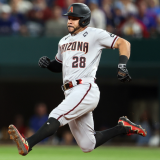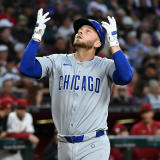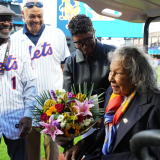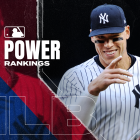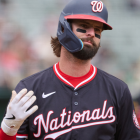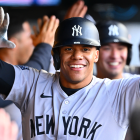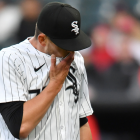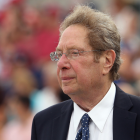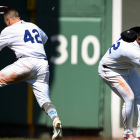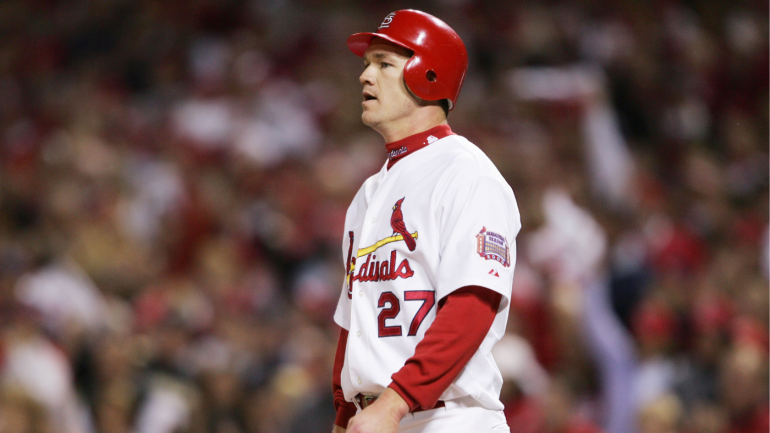
The 2020 Baseball Hall of Fame vote was unveiled Tuesday night and yielded an empty 2021 class. The main focus in the immediate aftermath of the voting results reveal will rightfully be on the top trio of Curt Schilling, Barry Bonds and Roger Clemens -- who all fell short again in their ninth year on the ballot.
Beyond the top-line focus, however, the movement for those further down the ballot matters, and many times it has implications moving forward. Just to name a few examples to illustrate the point:
- Tim Raines started at 24.3 percent. Through seven tries, he was at just 46.1 percent. Then he went 55 to 69.8 to 86 percent, the latter in his 10th and final try.
- Edgar Martinez started at 36.2 percent, and through six tries was sitting at 27 percent of the vote. He then caught fire to the tune of 43.4, 58.6, 70.4 and 85.4 percent, again, the latter being his 10th and final time on the ballot.
- Larry Walker started even lower. In 2011, he got just 20.3 percent of the vote. He dropped as low as 10.2 percent and was at just 34.1 percent on his eighth ballot. Then he jumped to 54.6 percent and finally 76.6 percent in his last go-round in 2020.
As for the players on this year's ballot who are hoping to go the way of Raines, Martinez, Walker and many others, here are five players who made up some important ground and one who lost some serious steam.
Something to keep in mind as we move forward: Voters are capped at 10 choices on their ballots. As such, players coming on and falling off ballots matters. Next year, A-Rod and David Ortiz join the ballot, but it's the last time for Barry Bonds, Rogers Clemens, Curt Schilling and Sammy Sosa. The following year, Carlos Beltran comes on and it's Jeff Kent's last hurrah. For the 2024 ballot, Adrian Beltre, Chase Utley and Joe Mauer join the fray while it's Gary Sheffield's last shot.
Riser: Scott Rolen
Similar to the Raines/Edgar/Walker movement, Rolen is looking destined for the Hall. After appearing on just 10.2 percent of the ballots in the 2018 vote, Rolen has gone to 17.2 to 35.3 and now 52.9 percent this year. In looking at the above paragraph with how things unfold the next few seasons and keeping in mind the voting body continues to evolve toward a more new-school approach, it seems like only a matter of time before Rolen is enshrined. It's possible it even happens next year, though I'll go with 2023 as the official prediction.
Riser: Todd Helton
Walker getting in was probably a big deal for Helton. Though Walker called other places home, he was most often at home in Denver with Coors Field housing 2,501 of his career 6,907 plate appearances. Helton only called Coors Field home and his home numbers are far better than his road numbers (though I've covered why it shouldn't disqualify him).
Helton started out at a pedestrian 16.5 percent in the 2019 vote, but jumped to 29.2 percent last year and netted 44.9 percent this year.
With seven votes left, I'm rather optimistic on Helton's chances of joining the Hall of Fame in the coming years.
Riser: Gary Sheffield
Though Sheffield has PED ties, his are less definitive than several others on this ballot. He's yet to rise to the level of Bonds and Clemens and it should be noted both of those players seem to have plateaued, meaning it's possible Sheffield eventually levels off as well. For now, he has some momentum. Through five vote cycles, Sheffield hovered between 11.1 and 13.6 percent, but last year he jumped to 30.5 percent and this time around got 40.6 percent.
He only has three votes left. The best guess is he doesn't make it, but there wasn't really much hope three vote cycles ago and that has changed.
Riser: Billy Wagner
In his first three voting cycles, Wagner sat between 10.2 and 11.1 percent. Then he modestly jumped to 16.7 percent before a leap to 31.7 percent and now 46.4 percent. That's some serious movement after stagnant totals early.
Wagner has four voting cycles left. Relievers are a difficult case to pin down. Lee Smith debuted on the ballot with 42.3 percent of the vote, but through 10 years had only climbed to 50.6 percent. Back then, players got 15 years and Smith lost support after his 10th. Wagner is a totally different animal and the voting bloc continues to change. I looked at Wagner's case with the backdrop of the challenge in judging relievers moving forward.
He's one to watch. If I had to guess, I'd say he falls short, but perhaps the ballot debuts of Joe Nathan and Jonathan Papelbon next year help illustrate just how much more dominant Wagner was than other elite-level closers and gives him a bump.
Riser: Andruw Jones
In 1960, Ralph Kiner got 1.1 percent of the vote by the BBWAA, but eventually got inducted into the Hall. The voting process was altered and revamped since then, though. With the current process, Bert Blyleven's 14.1 percent of the vote in 1999 is the lowest vote percentage of a player eventually elected by the BBWAA. As can be seen, others could come under Blyleven's mark, but Jones would be the lowest. He debuted with 7.3 percent of the vote in 2018 and only got 7.5 percent in 2019. Last year he jumped to 19.4 percent and now there's some strong momentum at 33.9 percent. Perhaps the voting body moving more new-school helps Jones due to his ridiculous defensive prowess (covered here). He's still not even halfway home, but with six voting cycles left, there's hope. I'll go out on a limb and say his momentum continues the next few years and he makes it eventually.
Faller: Omar Vizquel
Full disclosure: I'm completely lost as to the infatuation with Vizquel as a player. In 24 seasons, he posted a 4+ WAR twice and one of those was exactly 4.0. He was generally a bad batter (career 82 OPS+ with just two above-average seasons) and while he was an excellent defender, he wasn't Ozzie Smith or even Andruw Jones (who was a much better hitter). I don't speak for everyone, though, and Vizquel went from 37 to 42.8 to 52.6 percent in his first three years on the ballot. He fell to 49.1 percent this time around. It's likely there was impact from the MLB investigating domestic violence allegations against him.










